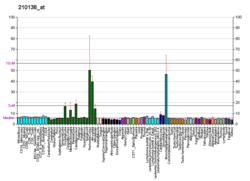RGS20
Regulator of G-protein signaling 20 is a protein that in humans is encoded by the RGS20 gene.[5][6][7]
Regulator of G protein signaling (RGS) proteins are regulatory and structural components of G protein-coupled receptor complexes. RGS proteins are GTPase-activating proteins for Gi (see GNAI1; MIM 139310) and Gq (see GNAQ; MIM 600998) class G-alpha proteins. They accelerate transit through the cycle of GTP binding and hydrolysis and thereby accelerate signaling kinetics and termination.[supplied by OMIM][7]
In melanocytic cells RGS20 gene expression may be regulated by MITF.[8]
Interactions
RGS20 has been shown to interact with GNAO1[9] and GNAZ.[5][10]
gollark: gl.kst
gollark: I am not guaranteeing support or correct function.
gollark: Fine, you can have it, I'll take your money.
gollark: I spent about 5 seconds picking a nice cyan from the colors list.
gollark: The colors are trivial.
References
- GRCh38: Ensembl release 89: ENSG00000147509 - Ensembl, May 2017
- GRCm38: Ensembl release 89: ENSMUSG00000002459 - Ensembl, May 2017
- "Human PubMed Reference:". National Center for Biotechnology Information, U.S. National Library of Medicine.
- "Mouse PubMed Reference:". National Center for Biotechnology Information, U.S. National Library of Medicine.
- Glick JL, Meigs TE, Miron A, Casey PJ (October 1998). "RGSZ1, a Gz-selective regulator of G protein signaling whose action is sensitive to the phosphorylation state of Gzalpha". The Journal of Biological Chemistry. 273 (40): 26008–13. doi:10.1074/jbc.273.40.26008. PMID 9748279.
- Wang J, Ducret A, Tu Y, Kozasa T, Aebersold R, Ross EM (October 1998). "RGSZ1, a Gz-selective RGS protein in brain. Structure, membrane association, regulation by Galphaz phosphorylation, and relationship to a Gz gtpase-activating protein subfamily". The Journal of Biological Chemistry. 273 (40): 26014–25. doi:10.1074/jbc.273.40.26014. PMID 9748280.
- "Entrez Gene: RGS20 regulator of G-protein signalling 20".
- Hoek KS, Schlegel NC, Eichhoff OM, Widmer DS, Praetorius C, Einarsson SO, et al. (December 2008). "Novel MITF targets identified using a two-step DNA microarray strategy". Pigment Cell & Melanoma Research. 21 (6): 665–76. doi:10.1111/j.1755-148X.2008.00505.x. PMID 19067971.
- Pagano M, Jordan JD, Neves SR, Nguyen T, Iyengar R (June 2008). "Galphao/i-stimulated proteosomal degradation of RGS20: a mechanism for temporal integration of Gs and Gi pathways". Cellular Signalling. 20 (6): 1190–7. doi:10.1016/j.cellsig.2008.02.008. PMC 3107604. PMID 18407463.
- Nagahama M, Usui S, Shinohara T, Yamaguchi T, Tani K, Tagaya M (December 2002). "Inactivation of Galpha(z) causes disassembly of the Golgi apparatus". Journal of Cell Science. 115 (Pt 23): 4483–93. doi:10.1242/jcs.00093. PMID 12414994.
Further reading
- Barker SA, Wang J, Sierra DA, Ross EM (December 2001). "RGSZ1 and Ret RGS: two of several splice variants from the gene RGS20". Genomics. 78 (3): 223–9. doi:10.1006/geno.2001.6659. PMID 11735229.
- Sierra DA, Gilbert DJ, Householder D, Grishin NV, Yu K, Ukidwe P, et al. (February 2002). "Evolution of the regulators of G-protein signaling multigene family in mouse and human". Genomics. 79 (2): 177–85. doi:10.1006/geno.2002.6693. PMID 11829488.
- Nixon AB, Grenningloh G, Casey PJ (May 2002). "The interaction of RGSZ1 with SCG10 attenuates the ability of SCG10 to promote microtubule disassembly". The Journal of Biological Chemistry. 277 (20): 18127–33. doi:10.1074/jbc.M201065200. PMID 11882662.
- Wang Y, Ho G, Zhang JJ, Nieuwenhuijsen B, Edris W, Chanda PK, Young KH (December 2002). "Regulator of G protein signaling Z1 (RGSZ1) interacts with Galpha i subunits and regulates Galpha i-mediated cell signaling". The Journal of Biological Chemistry. 277 (50): 48325–32. doi:10.1074/jbc.M206116200. PMID 12379657.
- Nagahama M, Usui S, Shinohara T, Yamaguchi T, Tani K, Tagaya M (December 2002). "Inactivation of Galpha(z) causes disassembly of the Golgi apparatus". Journal of Cell Science. 115 (Pt 23): 4483–93. doi:10.1242/jcs.00093. PMID 12414994.
- Fischer T, De Vries L, Meerloo T, Farquhar MG (July 2003). "Promotion of G alpha i3 subunit down-regulation by GIPN, a putative E3 ubiquitin ligase that interacts with RGS-GAIP". Proceedings of the National Academy of Sciences of the United States of America. 100 (14): 8270–5. Bibcode:2003PNAS..100.8270F. doi:10.1073/pnas.1432965100. PMC 166218. PMID 12826607.
- Xu GY, Hum WT, Sukits SF, Hsiao CL, Liu Y, Malakian K, et al. (April 2004). "1H, 13C and 15N resonance assignments of human RGSZ1". Journal of Biomolecular NMR. 28 (4): 409–10. doi:10.1023/B:JNMR.0000015374.29659.f9. PMID 14872136.
- Ajit SK, Ramineni S, Edris W, Hunt RA, Hum WT, Hepler JR, Young KH (April 2007). "RGSZ1 interacts with protein kinase C interacting protein PKCI-1 and modulates mu opioid receptor signaling". Cellular Signalling. 19 (4): 723–30. doi:10.1016/j.cellsig.2006.09.008. PMID 17126529.
- Ewing RM, Chu P, Elisma F, Li H, Taylor P, Climie S, et al. (2007). "Large-scale mapping of human protein-protein interactions by mass spectrometry". Molecular Systems Biology. 3 (1): 89. doi:10.1038/msb4100134. PMC 1847948. PMID 17353931.
This article is issued from Wikipedia. The text is licensed under Creative Commons - Attribution - Sharealike. Additional terms may apply for the media files.




